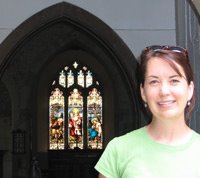10: Oxford beginnings
Actually, Oxford is perhaps where everything started.
George Austen, Jane’s father, came to St. John’s in 1747 when he was sixteen. He had been orphaned young – his mother died in childbirth, his father died a year after marrying a new wife. The stepmother, like the evil ones in fairy tales, kicked the little Austen children out to fend for themselves. George landed with an aunt in Tonbridge, made himself a scholar, and earned a Fellowship to study at St. John’s.
George Austen took the traditional Oxford course, the classics, which would later be called “Greats.” (I just got a copy of The History of the University of Oxford, Volume V, 18th Century, from a used book store in England to give me a better feel for what Oxford was like when the Austens were there. I want to know how old the students were and what their lectures or tutorials were like and what was expected of them, and how the city felt. I believe the Oxford colleges were primarily producing clergy then, and they were still burning heretical books in the courtyard of the Bodleian Library. But whose books were they burning in 1747?)
Further generations of Austens would follow George to St. John’s, founded in 1555 by Sir Thomas White. Mrs. Austen, Cassandra, was a descendant of Sir Thomas White’s sister, and thus the Austen children and grandchildren qualified for Founder’s Fellowships, if they were available. So a succession of brothers and nephews and great-nephews went to St. John’s (which wouldn’t begin admitting women until the 1980’s).
George Austen’s later life would be far removed from this realm. After he married, he became rector in one country parish and then another, ran a small farm, tended his growing family, and opened a boarding school for boys out of the Austen homestead, where he began their classical endeavors. He would go on to make sermons for people who must have been little educated, worry about the price of pigs, constantly attempt to make limited ends meet, and agonize over adopting his son Edward out to his childless cousins.
But in 1747 George Austen was a scholar. He did a Bachelor of Arts and Master of Arts and returned for a Bachelor of Divinity degree, also working at the school in various capacities (as assistant chaplain, dean of arts, Greek lecturer), where he became known as “the handsome proctor.” It’s thought that he and young Cassandra Leigh first met in Oxford, perhaps when she was visiting her uncle Theophilus.
If this is where George and Cassandra fell in love, perhaps in some ways, this is the best place to start.



0 Comments:
Post a Comment
<< Home